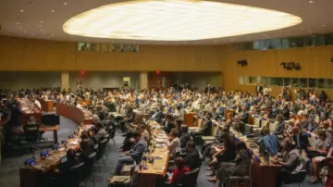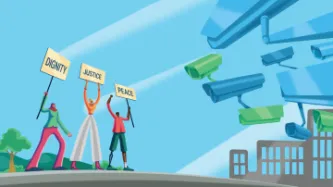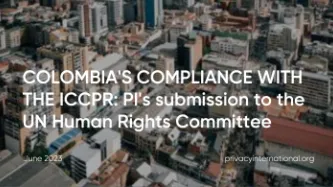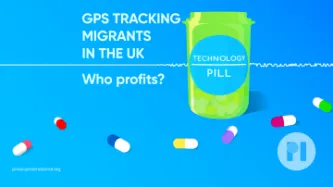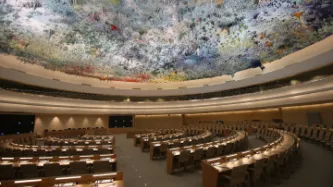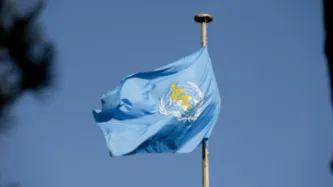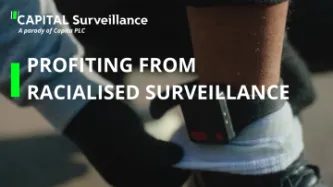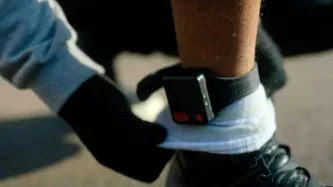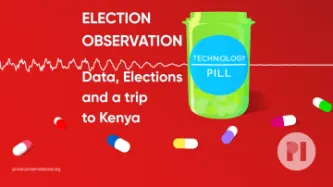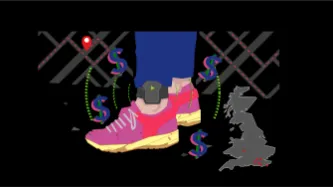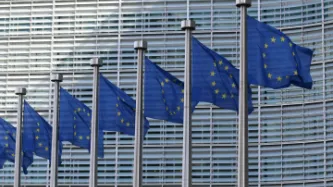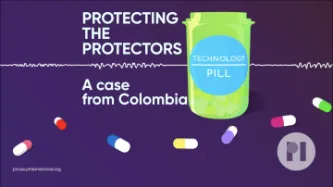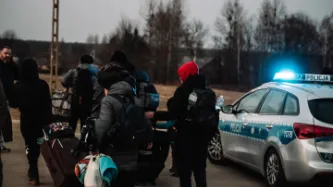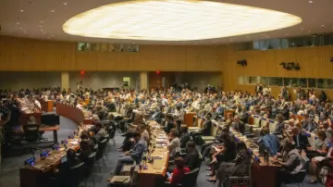Advanced Search
Content Type: Advocacy
This was submitted by PI and EFF for the sixth session of the Ad Hoc Committee, which is due to consider the text in August 2023.
Our submission covers provisions in the chapters related to procedural measures and law enforcement, as well as international cooperation of the proposed UN Cybercrime treaty (full title: Comprehensive international convention on countering the use of information and communications technologies for criminal purposes). We also provide general comments on Article 54…
Content Type: Advocacy
In June 2023, we made a submission to the Human Rights Committee ahead of its 138th Session in relation to Colombia’s compliance with the International Covenant on Civil and Political Rights (ICCPR).
We called on the UN Human Rights Committee to make the following recommendations to Colombia:
The Electoral Law should ensure that the electoral register does not include personal data other than what is required to establish eligibility to vote. The law should define the minimum…
Content Type: People
Julie is responsible for coordinating Privacy International’s global network of partner organisations. Privacy International works with civil society organisations from around the world to generate strategies to develop and sustain a global movement. Julie coordinates the joint research, advocacy, communication, campaigning and learning tactics with Privacy International’s partners in order to formulate new ways to demand change globally.
Before joining Privacy International, Julie worked at…
Content Type: Long Read
Why does this decision matter?
Our complaint against Criteo formed part of a larger set of coordinated complaints we filed in 2018 against 7 data brokers (Acxiom, Oracle), AdTech companies (Criteo, Quantcast, Tapad), and credit referencing agencies (Equifax, Experian) with data protection authorities in France (CNIL), Ireland, (DPC) and the UK (ICO). The EU General Data Protection Regulation (GDPR) had recently come into force, and the AdTech industry was (and still is) a prime affront to the…
Content Type: Video
Links
Send Capita an email
Find out more about the campaign
Watch the full video testimonies
Video 1
Video 2
Content Type: Press release
La CNIL a aujourd'hui prononcé une sévère sanction contre Criteo, une des plus grandes sociétés françaises de pistage et publicité en ligne. Le montant de l'amende a été réduit de 60 à 40 millions d'euros depuis l'audience qui s'est tenue à la CNIL en Mars 2023, durant laquelle Criteo avait mis en avant son bénéfice net de 10 millions d'euros en 2022 pour plaider en faveur d'une réduction de sa peine. La CNIL semble avoir entendu ces arguments, mais a heureusement maintenu une amende…
Content Type: Press release
French data regulator CNIL announced today a strong sanction against Criteo, one of the world's largest AdTech companies. Although close to the maximum GDPR fine, the amount of the fine was reduced from 60 to 40 million following a hearing at CNIL's offices in March 2023, during which Criteo pleaded for a reduced fine in light of its 10 million euros profit in 2022. CNIL seems to have acknowledged this argument but maintained a significant fine. This sanction follows a Privacy International…
Content Type: Advocacy
Privacy International contributed to the UNSR's report by submitting information on the work we have done as well as our Network of partners as we’ve monitored and responded to developments associated with the use of data and technology in the health care sector by governments and companies.
Content Type: Advocacy
Privacy International (PI) notes the Bureau’s text of the WHO convention, agreement or other international instrument on pandemic prevention, preparedness and response (“WHO CA+”).
PI has sought to closely follow and engage with the discussions leading up to the draft treaty, despite the significant limitations to civil society participation in the process. In February 2023, we intervened during the briefing organised by the INB bureau and published our comments on the zero draft of the WHO CA…
Content Type: Advocacy
Background
In August 2022, Amazon announced that they had entered into a definitive merger agreement to acquire iRobot, a company that specialises in designing and building consumer robots. The transaction was formally notified to the European Commission on 1 June 2023, while the UK Competition and Markets Authority (CMA) has already launched an investigation into the transaction since April 2023.
We believe that this acquisition is likely to significantly impede effective competition in and…
Content Type: People
Tom joined Privacy International as a Legal Officer in May 2023. His work primarily relates to the impact of big tech and new tech on privacy, in particular in relation to health, employment and data brokerage. Prior to PI, Tom has worked within the environmental law sector, at NGO ClientEarth and in the Secretariat of the UNECE Aarhus Convention, and on legislative processes at the Hansard Society for parliamentary democracy.His education includes a PhD in International Environmental and Human…
Content Type: Press release
Campaigners assembled outside Capita PLC’s Annual General Meeting in the City of London today (Thursday 11th May) are contesting the outsourcing company’s £114m contract to deliver 24/7 GPS monitoring services, used by the Home Office to surveil people without British citizenship.
Capita shareholders were greeted by a circling mobile billboard van and leaflets informing AGM attendees of the grave human rights and health risks associated with Capita’s GPS tracking contract. Charities Bail for…
Content Type: Long Read
With the introduction of GPS tracking of people on immigration bail, the UK has recently put GPS ankle tags, and their potential privacy and security issues, under the spotlight. PI has exposed the intrusive nature and shortcomings of these devices through technical explainers and complaints to the UK data protection and forensic science regulators.
But, what better way to understand the risks associated with a device than to actually use one? In order to further consolidate our understanding…
Content Type: Video
Links
Human rights abuses including unlawful killings by police, violence at Kenya's 2017 election
Claims of fraud from Kenya's last election
PI and the Carter Center's joint election report
Challenge to the 2022 election result and Supreme Court decision
More about the use of data in elections
Our data and elections checklist
Content Type: Long Read
The rise of racist and xenophobic narratives around the world has led to a ramping up of brutal migration control policies. Indefinite detention, pushbacks of boats at sea, or deportation for offshore processing of asylum claims all now form part of the arsenal deployed by some governments to “appear tough” on and provide "solutions" to immigration. A stark example is the UK’s “hostile environment” policy, announced 10 years ago by then Home Secretary Theresa May and designed to deter migrants…
Content Type: Advocacy
Privacy International welcomes the aim of the Cyber Resilience Act to bolster cybersecurity rules to ensure more secure hardware and software products. Nevertheless, we note that the proposal put forward by the European Commission contains certain shortcomings which could both hamper innovation and harm consumers who are increasingly relying on digital products and services.It is essential these shortcomings, detailed below, are effectively addressed by the EU co-legislators through the…
Content Type: Long Read
In 2022, Privacy International continued to produce real change by challenging governments and corporations that use data and technology to exploit us. And, we produced substantial impact that directly affects each of us.
Here are a handful of our biggest achievements in 2022.
WE CHALLENGED COMPANIES TO CHANGE THEIR BUSINESS MODELS AND PRACTICES
Regulators in UK, France, Greece, and Italy fined and restricted Clearview AI’s activity
Clearview AI built a massive database of our biometrics, by…
Content Type: People
Josie (she/ her) is a Senior Advocacy Officer at Privacy International (PI). Her work focuses on: resisting authoritarianism, protecting the election cycle, people with disabilities' right to privacy, and the surveillance and externalisation of borders.Prior to PI, she held senior roles at the Bahrain Institute for Rights and Democracy (BIRD) focusing on human rights in the Gulf, namely the death penalty, political prisoners, asylum and corporate accountability, and at a child rights NGO in…
Content Type: Video
Links
The organisation who put us in touch with Claudia is called Media Defence, they are an international human rights organisation which provides legal defence to journalists, citizen journalists and independent media around the world who are under threat for their reporting. Find out more about them and their work.
You can also read more about Claudia, her work, and the cases she's taken forward on Media Defence's website.
Claudia's case against the former Administrative Department of…
Content Type: Advocacy
This joint submission to the European Commission consultation on security-related information sharing was signed by Border Violence Monitoring Network (BVMN), Statewatch, Euromed Rights, European Digital Rights (EDRi), Access Now, Privacy International (PI), Refugee Law Lab (York University), Homo Digitalis and the Platform for International Cooperation on Undocumented Migrants (PICUM). Signatures were subsequently added from European Network Against Racism (ENAR), Dr Derya Özkul and Dr Niovi…
Content Type: Long Read
The final report on the 2022 Kenyan election is the result of a collaboration with the Carter Center as part of a joint pre-election assessment focussing on the use of technology in the run up to and during the Kenyan election which took place 9 August. The final report, published this month, follows our preliminary statement of September 2022.
Below we set out a few key observations in connection with the use of data and technology, as well as some of the key data protection incidents.
Key…
Content Type: Video
In January 2023, the UK's Investigatory Powers Tribunal handed down a landmark judgment. The Tribunal held that there were “very serious failings” at the highest levels of MI5 - the UK's domestic intelligence agency - to comply with privacy safeguards from as early as 2014, and that successive Home Secretaries did not to enquire into or resolve these long-standing rule-breaking despite obvious red flags.
In this episode, we talk to Meg Goulding, a lawyer at the UK-based campaigning…
Content Type: Examples
The Mississippi legislature has introduced a bill that would require public schools and postsecondary institutions to install video surveillance cameras that record audio throughout their campuses, including in classrooms, auditoriums, cafeterias, gyms, hallways, recreational areas, and along each campus's perimeter, and allow parents to vies live feeds of classroom instructions. The bill's sponsor, state representative Stacey Hobgood Wilkes (R-Picayune) says the bill's provisions would help…
